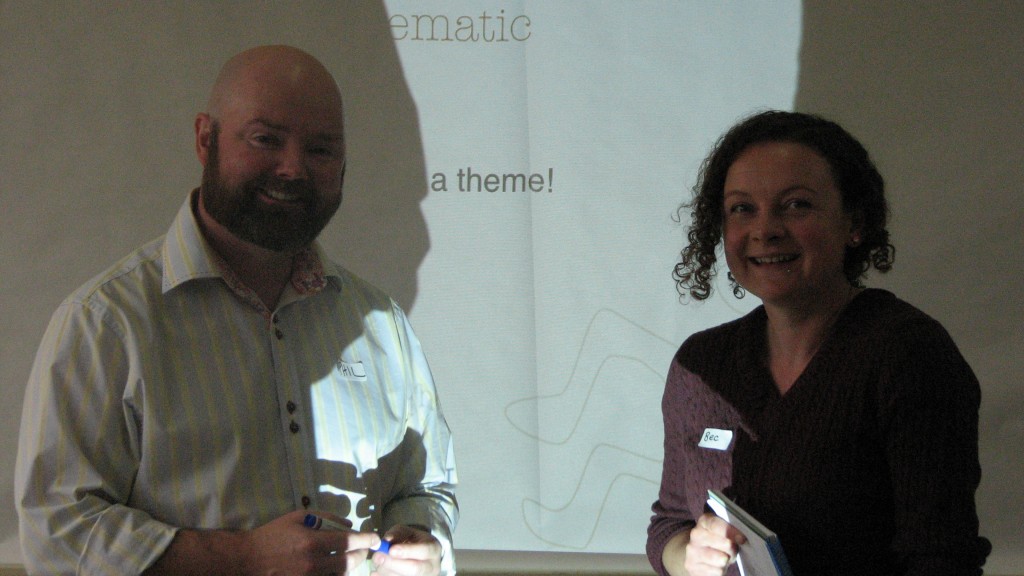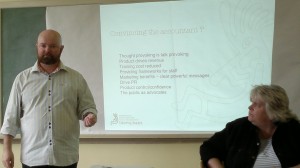 Rebecca Tudor talking to Phil Fitzpatrick.
Rebecca Tudor talking to Phil Fitzpatrick.
The Friends of Willow Court committee and guests attended a Thematic Interpretation workshop this week to help understand and plan for professional themed tours when the site opens in the coming months. Facilitator Phil Fitzpatrick took us through a process of understanding Thematic Interpritation and offered many examples. It wasn’t long before we started to get down to business with the interpretation overview of Willow Court. The Committee worked in small groups to discuss themes and the planned visitor experience that would align with the theories behind Thematic interpretation. Tourism Tasmania recommend that a full Thematic plan be in place with all tourist experiences and it is considered as best practice. It was also great to have Derwent Valley Council representation there to join us, Councillor Tony Nicholson has an immense personal knowledge and a passion for the Willow Court Site and how it can contribute to the Derwent Valley as a whole. A plan was created in 2006 by the Derwent Valley Council and offers a lot of insight to the contents of what a new plan would contain. Thematic Interpretation Plan 2006
Phil going through some basic theory.
Thematic interpretation is an approach to heritage interpretation originally advocated by professor William J. Lewis (University of Vermont)[1] and subsequently developed by professor Sam H. Ham (University of Idaho). In the thematic approach, an interpreter relies on a central theme (i.e., a major point or message) to guide development of a communication activity or device. In presenting the activity or device, the thematic interpreter develops the theme in such a way that it will be highly relevant to an audience. According to studies, presenting a strongly relevant theme greatly increases the likelihood an interpreter will succeed in provoking an audience to think about theme-related issues. http://en.wikipedia.org/wiki/Thematic_interpretation
Conservation Committee Member Anne McKinstray learning about “Convincing the Accountant”
About the facilitator:
Phil Fitzpatrick brings 20 years of tourism industry experience to his work as an interpretative strategy consultant, and brand specialist. Phil is also the Manager of Redlands Estate in the Derwent Valley.
Description
Phil is a highly skilled and extensively trained strategic communicator and thematic interpretation specialist, combining many years of developing, presenting, training and management experience in the industry with solid teaching in the principles of thematic interpretation. His comprehensive understanding of creative methods, combined with clear processes, result in a strong focus on conveying powerful messages and meaning to target audiences. The ultimate long range value is in stregthening the brand of the client and using these methods to inform brand and market planning.
Phil’s many projects include his leading role in interpretation and design for Tasmania’s West Coast Wilderness Railway. He worked closely with staff and stakeholders on the design, development and implementation of signage and the production of an award-winning guidebook for the Railway. This project covered every aspect of the product’s interpretive content, design and delivery and was used as a case study for Tourism Tasmania’s pilot program Building Visitor Experience.
In early 2008, Phil Fitzpatrick and Maura Bedloe of Working Words joined with consultant David Inches of Inspired by Marketing to develop a major heritage interpretation strategy for a region of northern Tasmania. This project covered a wide geographical area and encompassed a diverse community, united by a section of main road stretching between the towns of Hadspen and Westbury. The team engaged deeply in research and community consultation, including an exhaustive interpretive inventory process and series of interpretive workshops involving local community and stakeholders. The project team successfully delivered an interpretive strategy that is unique in the state. No record
currently exists within Tasmania of an entire region adopting a thematic approach for implementation across multiple towns and communities.
Hierophant Projects
Phil has consulted on the following interpretation development in 2009/10
Sarah Island: Interpretive strategy, design, development implementation planning and instalation design
Lifeline Hobart: Brand strategy development and communication strategy
Tourism Tasmania: interpretive strategy for World Heritage nominated convict sites of Tasmania.
TVIN: Brand application, logo identity, creative look and feel
Elmslie Wines Tasmania: Interpretive Elements, brand application, logo identity, creative look and feel
Saffire resort: Interpretive planning, product development, training and content research and development
Bay of Fires: Brand application, logo identity, creative look and feel
The Southern Lights Hotel: Core brand development, brand application, logo identity, creative look and feel
Clarence Valley Council: Communication strategy and brand application (NSW)
Meander Valley Council and Tourism Tas: Interpretive planning for the Northern Heritage Tourism Development Plan
Port Arthur Historic Site: Development of training program and delivery of interpretation training for frontline staff
Tasmanian Devil Conservation Park: Interpretive strategy design, development and implementation planning
Lenna of Hobart (hotel): Interpretive strategy design, development and implementation planning
Gordon River Cruises (Pure Tasmania): Creative, visual interpretation
Puffing Billy Railway (VIC): brand application, interpretive strategy development, implementation planning and training
Flagstaff Maritime Museum (Warrnambool): Interpretation planning and guide training
Navigators Cruise Company: Interpretive strategy design, development, implementation planning and training
West Coast Wilderness Railway: visual interpretation development, implementation and training
Tourism Tasmania: EROT, interpretation training to industry
The Federal Group: Three Capes Project interpretive concept development
Forestry Tasmania: Interpretation review, development, implementation planning and training
Signature Experience Pilot Program, Tourism Tas: Developing interpretive planning, toolkits, training and mentoring process for seven key tourism businesses in Tasmania
